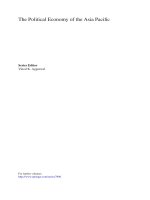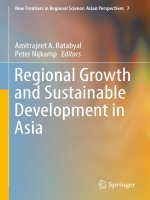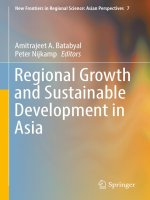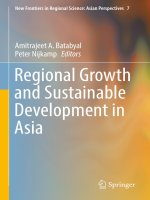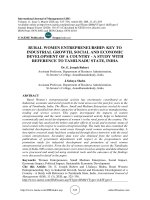Economic growth and economic development 220
Bạn đang xem bản rút gọn của tài liệu. Xem và tải ngay bản đầy đủ của tài liệu tại đây (84.01 KB, 1 trang )
Introduction to Modern Economic Growth
population, which initially reduces capital-to-labor and land-to-labor ratios, depressing income per capita. This initial decline is later compensated by higher output
as more people enter the labor force. However, there is no reason to expect either
a complete offset of the initial decline in income per capita or a large significant
increase, especially when many of the effect countries are heavily vested in agriculture, so that land-to-labor ratios may change permanently. Consequently, small
beneficial effects of health on productivity may not be sufficient to offset or reverse
the negative effects of population pressures on income per capita.
4.7. Political Economy of Institutions: First Thoughts
The evidence presented in this chapter suggests that institutions are the most
important fundamental cause of economic growth. We must therefore think about
why institutions and policies differ across countries in order to understand why some
countries are poor and some are rich. We will also argue below that understanding
institutional changes holds clues about why the process of world economic growth
started 200 years ago or so.
However, an explanation of differences in income across countries and over time
in terms of institutional differences is also incomplete. If, as this chapter has documented, some institutions are conducive to rapid economic growth and others to
stagnation, why would any society collectively choose institutions that condemn
them to stagnation? The answer to this question relates to the nature of collective
choices in societies. Institutions and policies, like other collective choices, are not
taken for the good of the society at large, but are a result of a political equilibrium.
In order to understand such political equilibria, we need to understand the conflicting interests of different individuals and groups in societies, and how they will be
mediated by different political institutions. Thus, a proper understanding of how
institutions affect economic outcomes and why institutions differ across countries
(and why they sometimes change and pave the way for growth miracles) requires
models of political economy, which explicitly studies how the conflicting interests of
different individuals are aggregated into collective choices. Models of political economy also specify why certain individuals and groups may be opposed to economic
growth or prefer institutions that eschew growth opportunities.
206



